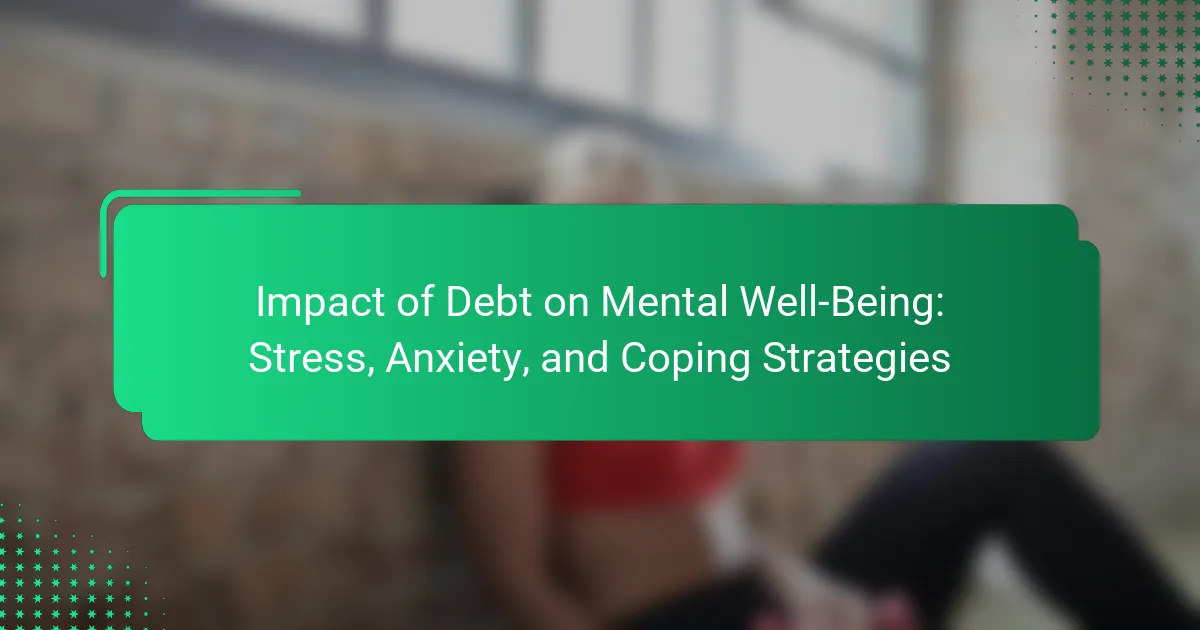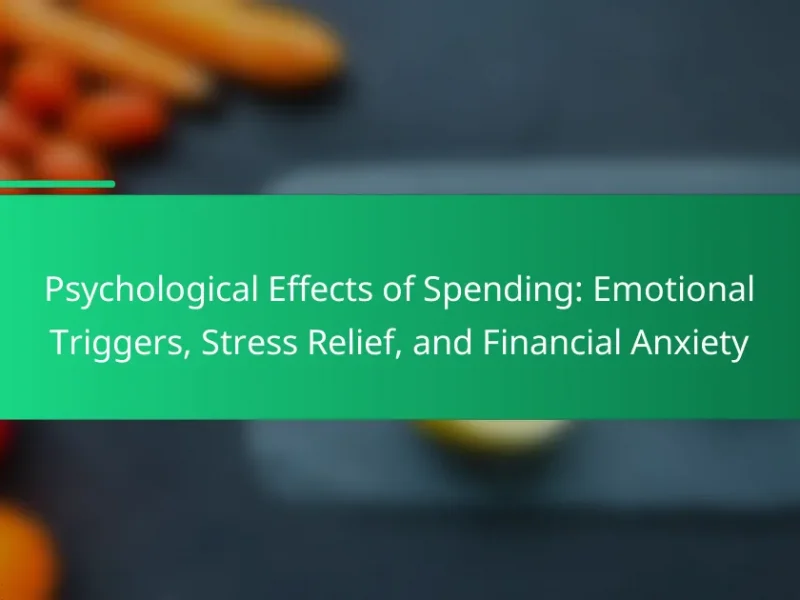Debt can severely affect mental well-being, leading to increased stress and anxiety. Individuals often feel hopeless and isolated due to financial burdens. This article explores the psychological consequences of debt, effective coping strategies like budgeting and seeking professional advice, and the benefits of mindfulness practices in alleviating stress. Understanding these aspects can help individuals manage their mental health while navigating financial challenges.

How Does Debt Affect Mental Well-Being?
Debt significantly impacts mental well-being by increasing stress and anxiety levels. Individuals facing financial burdens often experience feelings of hopelessness and isolation. Studies indicate that those with high debt levels report poorer mental health outcomes, including depression. Effective coping strategies include seeking support from friends, financial counseling, and mindfulness practices. These approaches can mitigate the psychological effects of debt and promote resilience.
What Are the Psychological Effects of Debt?
Debt significantly impacts mental well-being, leading to stress and anxiety. Individuals often experience feelings of helplessness and worry about financial stability.
Research indicates that high debt levels correlate with increased rates of depression and anxiety disorders. A study found that 30% of people in debt report feeling overwhelmed by their financial situation.
Coping strategies can mitigate these effects. Effective approaches include budgeting, seeking financial advice, and practicing mindfulness. These strategies help individuals regain control and reduce anxiety related to debt.
Addressing the psychological effects of debt is crucial for overall mental health. Awareness and proactive management can lead to improved emotional well-being and resilience.
How Does Debt Contribute to Stress and Anxiety?
Debt significantly contributes to stress and anxiety by creating financial pressure and uncertainty. Individuals often experience feelings of helplessness and fear regarding their financial futures. Research shows that high debt levels correlate with increased anxiety and depression rates. Effective coping strategies include budgeting, seeking financial advice, and practicing mindfulness.
What Are the Common Symptoms of Debt-Related Stress?
Common symptoms of debt-related stress include anxiety, irritability, insomnia, and difficulty concentrating. These symptoms can significantly impact mental well-being. Research shows that 73% of individuals with financial stress report anxiety, while 67% experience sleep disturbances. Effective coping strategies involve budgeting, seeking financial advice, and practicing mindfulness techniques. Addressing these symptoms promptly can improve overall mental health and resilience against stress.
How Does Financial Stress Impact Daily Life?
Financial stress significantly impacts daily life by increasing stress and anxiety levels. Individuals often experience difficulty concentrating, disrupted sleep, and strained relationships. Coping strategies such as budgeting, seeking financial advice, and practicing mindfulness can mitigate these effects. Research shows that financial stress is linked to higher rates of depression and anxiety disorders, highlighting the need for effective management techniques.
What Unique Factors Influence Mental Health in Relation to Debt?
Debt significantly influences mental health by increasing stress and anxiety levels. Factors such as financial instability, fear of insolvency, and social stigma contribute to these mental health challenges. Research indicates that individuals with high debt levels are more likely to experience depression and anxiety disorders. Effective coping strategies, including seeking financial advice and emotional support, can mitigate these negative effects. Addressing the unique relationship between debt and mental well-being is crucial for fostering resilience and promoting mental health.
How Do Social Perceptions of Debt Affect Mental Health?
Social perceptions of debt significantly impact mental health, contributing to stress and anxiety. Individuals often feel shame and stigma associated with debt, leading to emotional distress. Studies show that high debt levels correlate with increased rates of anxiety disorders and depression. Coping strategies, such as seeking financial advice or support groups, can mitigate these effects. Understanding societal attitudes towards debt can help in developing effective mental health interventions.
What Role Does Employment Status Play in Debt-Related Anxiety?
Employment status significantly influences debt-related anxiety. Individuals with stable jobs often experience lower anxiety levels compared to those unemployed or in precarious positions. Job security provides a sense of financial stability, reducing stress associated with debt. Conversely, unemployment can lead to increased worry about meeting financial obligations, exacerbating mental health issues. Research indicates that 70% of unemployed individuals report heightened anxiety levels linked to their financial situation. Thus, employment status serves as a crucial factor in understanding the relationship between debt and mental well-being.
What Are the Rare Psychological Responses to Debt?
Debt can lead to rare psychological responses such as dissociation and existential anxiety. These responses may manifest as a feeling of detachment from reality or an overwhelming sense of questioning one’s purpose. Individuals experiencing these effects often struggle with traditional coping strategies, making it crucial to seek tailored mental health support. Research indicates that these rare responses are linked to prolonged financial stress, highlighting the need for awareness and intervention.
How Can Debt Lead to Depression?
Debt can significantly contribute to depression by causing chronic stress and anxiety. Financial strain often leads to feelings of hopelessness and isolation. Individuals struggling with debt may experience sleep disturbances and loss of interest in daily activities. Effective coping strategies include seeking financial advice, practicing mindfulness, and building a support network. Research indicates that addressing financial issues can improve mental well-being, highlighting the need for proactive measures.
What Is the Connection Between Debt and Suicidal Thoughts?
Debt significantly contributes to suicidal thoughts by inducing stress and anxiety. Financial burdens can overwhelm individuals, leading to feelings of hopelessness. Research indicates that individuals in severe debt are at a higher risk for mental health issues, including depression. Effective coping strategies, such as seeking financial counseling and emotional support, can mitigate these impacts. Addressing the emotional toll of debt is crucial for improving mental well-being.

What Coping Strategies Can Help Manage Debt-Related Stress?
Effective coping strategies for managing debt-related stress include budgeting, seeking professional advice, and practicing mindfulness. These approaches can significantly reduce anxiety and improve mental well-being.
Budgeting helps individuals track expenses and prioritize payments, fostering a sense of control. Seeking professional advice from financial counselors can provide tailored strategies and emotional support. Mindfulness practices, such as meditation or deep breathing, can alleviate stress by promoting relaxation and focus.
Combining these strategies can create a comprehensive approach to managing debt-related stress, enhancing both financial and mental health.
What Are Effective Techniques for Reducing Anxiety About Debt?
To reduce anxiety about debt, consider practical techniques such as budgeting, seeking professional advice, and practicing mindfulness. These strategies can help manage stress and improve mental well-being.
Budgeting allows for better control over finances, providing a clear view of income and expenses. Seeking professional advice can offer tailored solutions and alleviate feelings of isolation. Mindfulness practices, like meditation, can reduce anxiety by promoting relaxation and present-moment awareness.
Implementing these techniques can lead to a more positive mindset regarding debt, fostering resilience and coping skills.
How Can Budgeting Improve Mental Well-Being?
Budgeting can significantly enhance mental well-being by reducing stress and anxiety associated with debt. It provides a clear financial roadmap, enabling individuals to manage their expenses effectively. As a result, budgeting fosters a sense of control and security, which are essential for emotional stability. Studies indicate that individuals who budget regularly report lower levels of financial anxiety and improved overall mental health. By implementing coping strategies such as tracking spending and setting realistic financial goals, individuals can mitigate the negative impacts of debt on their mental state.
What Role Do Support Networks Play in Coping with Debt?
Support networks play a critical role in coping with debt by providing emotional and practical assistance. They help individuals manage stress and anxiety associated with financial burdens, fostering resilience. Engaging with supportive friends, family, or community groups can lead to improved mental well-being, enhancing coping strategies. Research indicates that social support reduces feelings of isolation and increases the likelihood of seeking financial solutions. By sharing experiences and resources, individuals can feel empowered to tackle their debt, ultimately leading to better mental health outcomes.
How Can Professional Help Alleviate Mental Strain from Debt?
Professional help can significantly reduce mental strain from debt by providing coping strategies and emotional support. Therapy and counseling offer tools to manage stress and anxiety associated with financial burdens. Cognitive-behavioral therapy (CBT) is particularly effective, as it helps individuals reframe negative thoughts related to debt. Additionally, financial advisors can assist in creating manageable budgets, alleviating the overwhelming feeling of financial chaos. Engaging with support groups fosters a sense of community, allowing individuals to share experiences and solutions. Overall, professional assistance addresses both emotional and practical aspects, promoting mental well-being amidst financial challenges.
When Should You Seek Therapy for Debt-Related Issues?
Seek therapy for debt-related issues when stress and anxiety become overwhelming. Signs include persistent worry about finances, difficulty concentrating, and changes in sleep or appetite. Therapy can provide coping strategies and emotional support. According to the American Psychological Association, financial stress can lead to mental health disorders, making early intervention crucial. Seeking help can improve overall well-being and provide tools to manage debt effectively.
What Types of Financial Counseling Are Available?
Financial counseling includes various types aimed at addressing debt’s impact on mental well-being. Options include individual counseling, group sessions, and online resources. Individual counseling provides personalized strategies to cope with stress and anxiety related to debt. Group sessions offer shared experiences and support, fostering a sense of community. Online resources, such as webinars and articles, provide accessible information on coping mechanisms and financial management. Each type serves unique needs, enhancing mental resilience against debt-related stress.
What Best Practices Can Help Maintain Mental Health While Managing Debt?
To maintain mental health while managing debt, develop a structured plan. Prioritize budgeting, track expenses, and set realistic payment goals. Engage in stress-reducing activities like exercise and mindfulness. Seek support from friends, family, or professionals. Regularly assess your mental state and adjust strategies as needed.
How Can Mindfulness Techniques Support Financial Wellness?
Mindfulness techniques can significantly enhance financial wellness by reducing stress and anxiety associated with debt. These practices promote emotional regulation and improve coping strategies, allowing individuals to manage financial pressures more effectively. Research shows that mindfulness can lead to better decision-making and increased resilience in the face of financial challenges. Regular mindfulness practice, such as meditation or deep breathing exercises, can help individuals cultivate a balanced perspective on their financial situation, ultimately supporting overall mental well-being.
What Common Mistakes Should Be Avoided in Managing Debt Stress?
To manage debt stress effectively, avoid common mistakes like ignoring the problem, not seeking help, and failing to create a budget. Acknowledging debt is crucial for mental well-being. Seeking professional advice can provide coping strategies. Establishing a realistic budget helps track expenses and prioritize payments, reducing anxiety. Regularly reviewing financial goals and adjusting plans can also alleviate stress.


